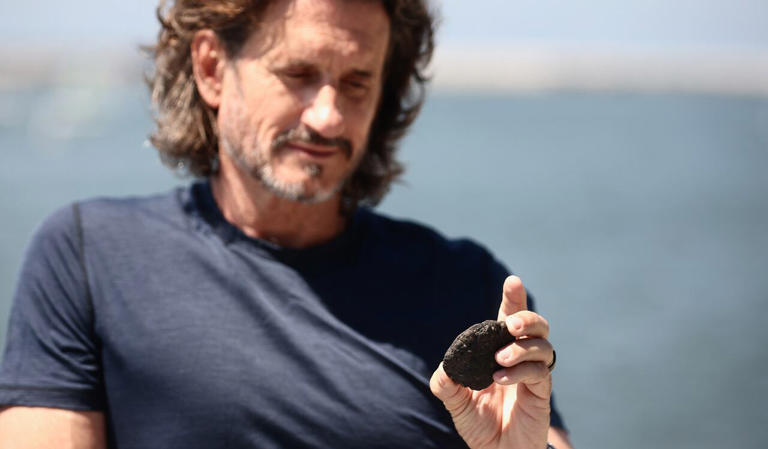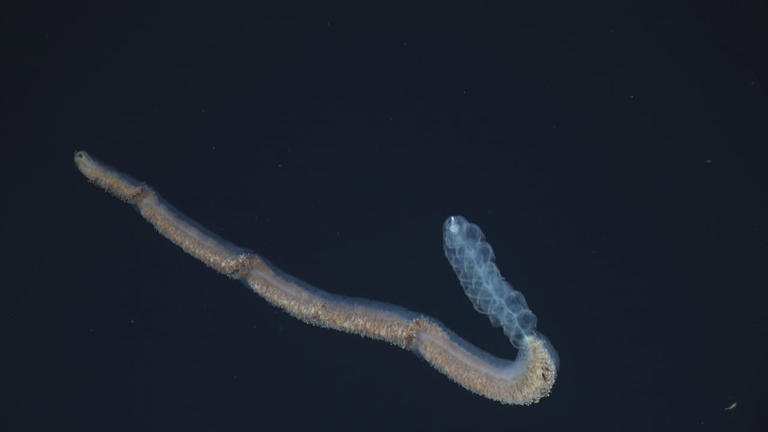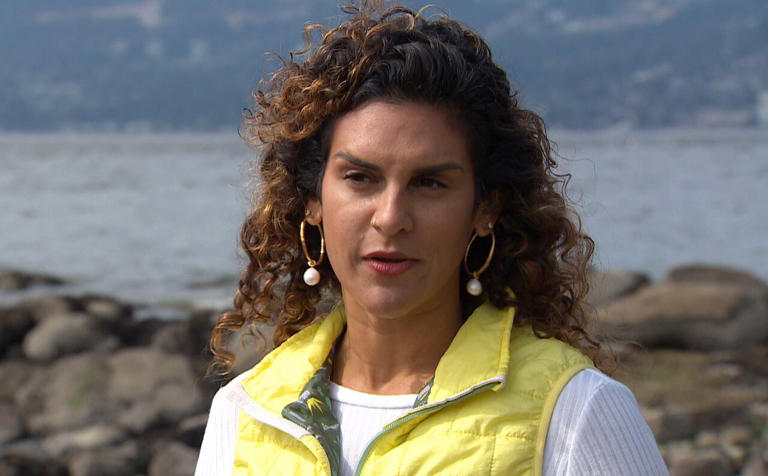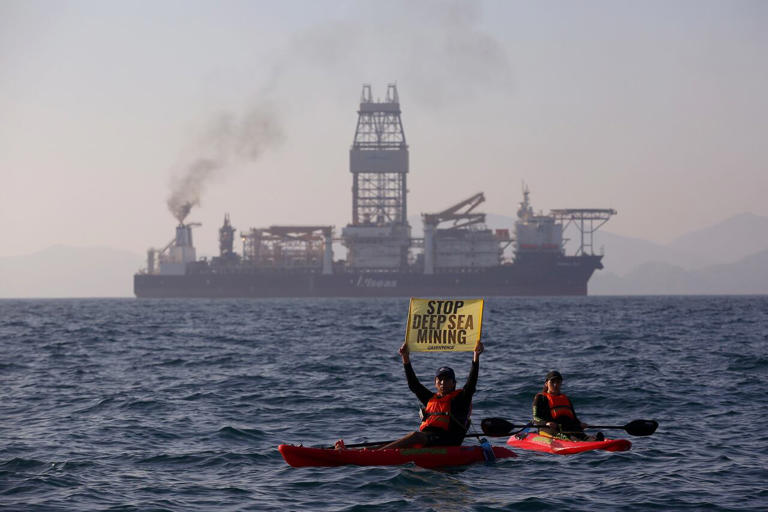Story by Susan Ormiston and Carly Thomas • TODAY
Gerard Barron, the CEO and chairman of The Metals Company, pulls a fist-sized black rock out of his pocket and displays it proudly in his hand.
"Everything you need to build an EV battery cathode is in here," he says. "It's an amazing mix of metals that are just made for this time we find ourselves in."
Barron carries that rock everywhere and has finely tuned his pitch over hundreds of investor meetings as he tries to explain his vision of mining the deep seabed, which has never been done before.
The rock, technically a polymetallic nodule, is laced with high concentrations of nickel and copper, along with cobalt and manganese. Barron calls it a "battery in a rock" — another pitch line.
Registered in Canada, The Metals Company (TMC) is operationally an international mining start-up headed up by Barron, an Australian.
Dressed in a navy T-shirt and designer sneakers, Barron is in his mid-50s and gave off an air of part-prospector, part-promoter when CBC met him in late June by the ocean in Los Angeles, a pit stop in his international travels to sell deep sea mining to a wary public.

Gerard Barron, the CEO of The Metals Company, holds a piece of a polymetallic nodule laced with high concentrations of nickel and copper, along with cobalt and manganese. (Andrew Lee/CBC)© Provided by cbc.ca
"What we need are base metals so that we can build batteries and wind turbines and solar panels so we can move away from fossil fuels and address climate change and global warming," says Barron.
But to get them, TMC is going to vacuum the bottom of the sea in two parcels in the Clarion Clipperton Zone (CCZ), a 4.5-million-square-kilometre area in the Pacific Ocean partway between Mexico and Hawaii.
There are potentially big profits in the CCZ, one of the richest areas for nodules in the world's oceans.
"The reason they want to mine the deep seabed is not to protect the Earth from climate change," said Catherine Coumans, research co-ordinator at MiningWatch Canada. "They want to mine the deep sea because they want to make a profit."
This month, high-stakes international negotiations in Kingston, Jamaica, hosted by the International Seabed Authority could determine the future of deep sea mining and whether TMC can successfully pursue a permit this year to mine commercially.
Barron, who is in Kingston all month, is staring down a growing chorus of critics, including environmentalists and marine scientists who warn of irreversible damage, as well as a number of skeptical countries, including Canada, which signalled this week that it supports a "pause" on exploitation.
Massive deposits
Trillions of polymetallic nodules lie on the seafloor — "like golf balls on a driving range," says Barron. The U.S. Geological Survey estimates the nodules in the CCZ could hold more critical metals than all of the world's terrestrial reserves.
While this "green rush" to the bottom has attracted about a dozen competing companies and countries, TMC is leading the charge.
Last October, the company, with its partner Allseas, lowered an 80-tonne robotic "collector" to the ocean floor in exploration trials. Fitted with tracks, the vehicle rolled along the seabed sucking up nodules and everything else in its path.
Barron insists that the impact in the ocean is reduced compared with the bulldozing and blasting that takes place in terrestrial mines. But the robotic collector vehicle stirred up sediment, creating big plumes before the nodules travelled up a 4.5-kilometre-long riser to the surface.
Allseas retrofitted a former deepwater drill ship — renaming it The Hidden Gem — to do the trials, collecting 3,200 tonnes of rock.
"This one is about four million years old," said Barron, caressing the nodule in his hand.
But this is exactly the point, said Coumans. "This is an ecosystem that took millions of years to form and it has been untouched by human activity and it will take millions of years for this ecosystem to come back."
Mining it "is so destructive and so irreversible," she said.
Surging demand
But it's clear that to meet decarbonization goals, the world will need more critical minerals.
Josipa Petrunic, president and CEO of the Canadian Urban Transit Research and Innovation Consortium, said electric vehicles are "growing rapidly in Canada and globally."
The International Energy Agency estimates the world will need 19 times more nickel by 2040 to meet its decarbonization targets. Indonesia, the world's biggest nickel supplier, is bulldozing rainforests to expand mines.
"It is essentially like a gold rush — the exploration of the unknown without a lot of regulatory oversight right now, with the potential for billions and billions of dollars in profit," said Petrunic.

An increase in domestic electric vehicle production has been a priority for the Canadian government. Prime Minister Justin Trudeau is seen at an announcement on a Volkswagen electric vehicle battery plant in St. Thomas, Ont., in April 2023.
(The Canadian Press/Tara Walton)© Provided by cbc.ca
But some marine scientists are climbing onboard an international campaign to stop the moves toward commercial mining.
More than 700 marine scientists and policy experts signed an open letter in 2021 stating "we strongly recommend that the transition to the exploitation of mineral resources be paused."
Last month, the European Academies' Science Advisory Council echoed the warning: We should pause to reflect instead of rushing to an early decision that will later be regretted," wrote Peter Haugan, policy director at the Institute for Marine Research in Bergen, Norway.
A habitat for unique sea creatures
Earlier this year, Diva Amon, a marine biologist from Trinidad and Tobago wrote an op-ed in the New York Times titled, "A rush to mine the deep sea is underway. It must be stopped."
"For me, using deep sea mining to help fight the climate crisis is like smoking to lower stress," Amon told CBC News during a visit to Vancouver.
Contrary to the image of the deep sea as dark and lifeless, she says it is actually full of creatures who survive without light and at low oxygen levels.

Diva Amon, a deep sea marine biologist from Trinidad and Tobago, says the deep sea is full of creatures who survive without light and at low oxygen levels. (JAMSTEC/UH/TMC)© Provided by cbc.ca
"It looks like something from a Dr. Seuss novel — just this weird, wonderful, colourful but still just incredibly amazing life."
In May, scientists at the Natural History Museum in London released a database of new species discovered in the CCZ, including 5,000 that had never before been formally identified, like a mauve-coloired creature nicknamed "gummy squirrel."
In a statement, museum researcher Adrian Glover said, "It is imperative that we work with the companies looking to mine these resources to ensure any such activity is done in a way that limits its impact upon the natural world."
Amon argues mining is "short-term action that will cause long-term damage" to oceans, "which are critical for absorbing heat and sequestering carbon and storing it away for millions of years."
Not all countries on board
Barron admits he's not "feelin' the love" from his many critics. But he and The Metals Company also dispute many of the "desktop predictions" being fired his way.
He says TMC has spent $150 million US so far on scientific research and assessing the environmental impact. In fact, about 80 scientists and researchers went out on the exploration trials in the Pacific last year.

Diva Amon, a deep sea marine biologist from Trinidad and Tobago, said mining the deep seas to help fight the climate crisis 'is like smoking to lower stress.'
But some marine scientists are climbing onboard an international campaign to stop the moves toward commercial mining.
More than 700 marine scientists and policy experts signed an open letter in 2021 stating "we strongly recommend that the transition to the exploitation of mineral resources be paused."
Last month, the European Academies' Science Advisory Council echoed the warning: We should pause to reflect instead of rushing to an early decision that will later be regretted," wrote Peter Haugan, policy director at the Institute for Marine Research in Bergen, Norway.
A habitat for unique sea creatures
Earlier this year, Diva Amon, a marine biologist from Trinidad and Tobago wrote an op-ed in the New York Times titled, "A rush to mine the deep sea is underway. It must be stopped."
"For me, using deep sea mining to help fight the climate crisis is like smoking to lower stress," Amon told CBC News during a visit to Vancouver.
Contrary to the image of the deep sea as dark and lifeless, she says it is actually full of creatures who survive without light and at low oxygen levels.

Diva Amon, a deep sea marine biologist from Trinidad and Tobago, says the deep sea is full of creatures who survive without light and at low oxygen levels. (JAMSTEC/UH/TMC)© Provided by cbc.ca
"It looks like something from a Dr. Seuss novel — just this weird, wonderful, colourful but still just incredibly amazing life."
In May, scientists at the Natural History Museum in London released a database of new species discovered in the CCZ, including 5,000 that had never before been formally identified, like a mauve-coloired creature nicknamed "gummy squirrel."
In a statement, museum researcher Adrian Glover said, "It is imperative that we work with the companies looking to mine these resources to ensure any such activity is done in a way that limits its impact upon the natural world."
Amon argues mining is "short-term action that will cause long-term damage" to oceans, "which are critical for absorbing heat and sequestering carbon and storing it away for millions of years."
Not all countries on board
Barron admits he's not "feelin' the love" from his many critics. But he and The Metals Company also dispute many of the "desktop predictions" being fired his way.
He says TMC has spent $150 million US so far on scientific research and assessing the environmental impact. In fact, about 80 scientists and researchers went out on the exploration trials in the Pacific last year.

Diva Amon, a deep sea marine biologist from Trinidad and Tobago, said mining the deep seas to help fight the climate crisis 'is like smoking to lower stress.'
(Martin Diotte/CBC)© Provided by cbc.ca
The company says the sediment plumes will not travel as far or as high in the water column, as claimed, and the noise from the mining is mostly at the surface.
He's called the opposition "noise," and claims "the debate over deep sea mining is over, done."
That point is hyperbole, if the talks in Jamaica this month are any indication. The politics are thick at meetings of the International Seabed Authority (ISA), which grew out of the 1982 UN Convention on the Law of the Sea.
Created in 1994, the ISA regulates activities in international waters, guided by its 167 member nations, plus the European Union.
The ISA has been trying to come up with regulations — a mining code — but it's come up against a deadline, what's called the "two-year rule."
TMC partnered with the tiny island country of Nauru, which triggered the rule in 2021. The deadline passed last Sunday, meaning the ISA is obligated to consider applications for commercial mining.
Barron says his company will apply near the end of this year. But with mining regulations still not in place, a growing number of countries and observers are firmly opposed to fast-tracking permits.
Canada taking wait-and-see approach
On Monday, Canada announced it supported an interim moratorium on deep sea mining, essentially signalling it would not agree to mining regulations until it had seen more science on how to do it with the least impact on the environment.

Greenpeace protesters demonstrate against deep sea mining near a ship operated by Allseas called The Hidden Gem.
The company says the sediment plumes will not travel as far or as high in the water column, as claimed, and the noise from the mining is mostly at the surface.
He's called the opposition "noise," and claims "the debate over deep sea mining is over, done."
That point is hyperbole, if the talks in Jamaica this month are any indication. The politics are thick at meetings of the International Seabed Authority (ISA), which grew out of the 1982 UN Convention on the Law of the Sea.
Created in 1994, the ISA regulates activities in international waters, guided by its 167 member nations, plus the European Union.
The ISA has been trying to come up with regulations — a mining code — but it's come up against a deadline, what's called the "two-year rule."
TMC partnered with the tiny island country of Nauru, which triggered the rule in 2021. The deadline passed last Sunday, meaning the ISA is obligated to consider applications for commercial mining.
Barron says his company will apply near the end of this year. But with mining regulations still not in place, a growing number of countries and observers are firmly opposed to fast-tracking permits.
Canada taking wait-and-see approach
On Monday, Canada announced it supported an interim moratorium on deep sea mining, essentially signalling it would not agree to mining regulations until it had seen more science on how to do it with the least impact on the environment.

Greenpeace protesters demonstrate against deep sea mining near a ship operated by Allseas called The Hidden Gem.
(Gustavo Graf/Greenpeace)© Provided by cbc.ca
Canadian Natural Resources Minister Jonathan Wilkinson, along with the ministers of Fisheries and Oceans and Global Affairs Canada, released a statement clarifying their position.
"We recognize the importance of marine ecosystems as a climate regulator, and will continue to take and advocate for a precautionary approach to development."
In an interview with CBC News, Wilkinson said "it's not 'no' forever," but that there's a lot more science that needs to be done.
"It may well be that after we accumulate the science, that we actually make a decision that this can be done in a certain way, perhaps in certain places, but I'm not going to prejudge that," he said.

Minister of Natural Resources Jonathan Wilkinson has said that more science needs to be done to ensure the safety of seabed mining on marine ecosystems.
Canadian Natural Resources Minister Jonathan Wilkinson, along with the ministers of Fisheries and Oceans and Global Affairs Canada, released a statement clarifying their position.
"We recognize the importance of marine ecosystems as a climate regulator, and will continue to take and advocate for a precautionary approach to development."
In an interview with CBC News, Wilkinson said "it's not 'no' forever," but that there's a lot more science that needs to be done.
"It may well be that after we accumulate the science, that we actually make a decision that this can be done in a certain way, perhaps in certain places, but I'm not going to prejudge that," he said.

Minister of Natural Resources Jonathan Wilkinson has said that more science needs to be done to ensure the safety of seabed mining on marine ecosystems.
(Sean Kilpatrick/The Canadian Press)© Sean Kilpatrick/The Canadian Press
Environmental groups who've been advocating for more countries to sign onto a moratorium applauded Canada's stance.
We definitely see it as a small win and a step in the right direction," said Sarah King, head of Greenpeace Canada's Oceans and Plastics campaign. "Every country that voices opposition to this industry sends a signal that it's unacceptable that we allow a destructive industry to proceed."
Petrunic said mining is inherently "dirty" no matter where it occurs.
"There's no pretty picture to mining, whether it's under the water or above ground. And our question to ourselves, as Canadians and internationally, is how much destruction are we willing to accept in the interest of decarbonizing?"
Gerard Barron remains undeterred. When asked what will happen if the ISA decides to pause or block his company's application for commercial mining, he waved it away.
"I rate that as 0.1 of one percent chance," he says, the final point in his pitch.
Environmental groups who've been advocating for more countries to sign onto a moratorium applauded Canada's stance.
We definitely see it as a small win and a step in the right direction," said Sarah King, head of Greenpeace Canada's Oceans and Plastics campaign. "Every country that voices opposition to this industry sends a signal that it's unacceptable that we allow a destructive industry to proceed."
Petrunic said mining is inherently "dirty" no matter where it occurs.
"There's no pretty picture to mining, whether it's under the water or above ground. And our question to ourselves, as Canadians and internationally, is how much destruction are we willing to accept in the interest of decarbonizing?"
Gerard Barron remains undeterred. When asked what will happen if the ISA decides to pause or block his company's application for commercial mining, he waved it away.
"I rate that as 0.1 of one percent chance," he says, the final point in his pitch.
No comments:
Post a Comment